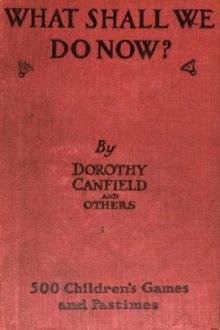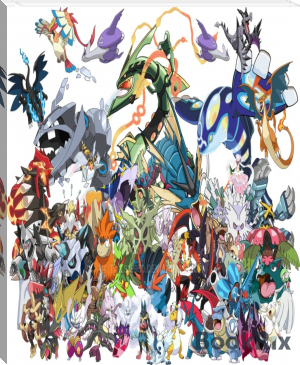What Shall We Do Now? - Dorothy Canfield Fisher (scary books to read .TXT) 📗

- Author: Dorothy Canfield Fisher
- Performer: -
Book online «What Shall We Do Now? - Dorothy Canfield Fisher (scary books to read .TXT) 📗». Author Dorothy Canfield Fisher
The players stand in as wide a circle as the size of the room allows, with one player in the middle. He has a rope or heavy cord in his hand with some object, rather heavy but not hard, tied to it, such as a small cushion or a large bunch of rags. Stooping down, he begins swinging this around the circle. As it comes to them the players must jump over the cord. As the cushion is swung faster and faster it goes higher and is more difficult to jump over. The first one to miss takes the place of the person swinging the rope, who is not allowed to raise his hand higher than his knee.
Parlor FootballIn this game goals are set up at each end of the room, the players are provided with fans, and the football is a blown hen's egg, which is wafted backward and forward along the floor.
BalloonA string is stretched across the room at a height of about three or four feet. The players divide into sides and line up on each side of the string. The balloon is then thrown up, the game being to keep it in the air backward and forward over the string, so that if it falls it will fall in the other side's camp. It ought to be tapped with the back of the fingers and not hit hard.
Tissue-Paper RaceIn this game tissue-paper is cut into pieces three or four inches square. As many squares as there are players are placed in a line at one end of the room, and at the other are placed two books, or other objects, a foot or so apart. At the word of command each competitor, who is armed with a Japanese fire-screen or fan, starts to fan his square through the goal-posts. For the sake of distinguishing them it is better to mark the papers or have them of different colors. A competitor may not fan any other square except by accident.
Walking SpanishThis game should not be played unless there are some older, stronger players to prevent possible accidents, but it is very amusing. Each player in turn goes to the end of the room, takes a cane or umbrella, puts his head down on the handle, closes his eyes and, stooping over thus, whirls rapidly about six times, not moving the point of the cane from its original position. Then instantly he straightens up and tries to walk steadily the length of the room along a string laid down or line marked. The one who steps nearest to the line all the time is the winner.
Potato RaceThis is a good game for a hall or landing. Two baskets are needed, which are placed at one end of the hall about two yards apart, and then in a line from each basket are placed potatoes, at intervals of a yard or so all down the floor, an equal number to each line. Any even number of competitors can play, the race being run in heats. Each competitor is armed with a long spoon, and his task is to pick up all the potatoes on his line and return them to the basket before his opponent can. Each potato must be carried to the basket in turn, and if dropped on the way must be picked up again before another can be touched, and the spoon only must be used. Any help from the other hand or from the foot disqualifies.
Fire-BucketsAt a fire in the country, where there is no hose, a line of men extends from the burning house to the nearest pond, and buckets are continually being passed along this line. Hence the name by which this excellent game is called here. It is played thus. A large number of miscellaneous and unbreakable articles—balls, boots, potatoes, books, and so on—are divided into two exactly equal groups, and each group is placed in a clothes basket. The company then forms into two equal lines, and each chooses a captain. Each captain stands by the basket at one end of his line, at the other end being a chair and another player standing by that. At the word "Start," the articles are handed one by one by the captain to the first player in the line, and passed as quickly as possible without dropping to the player by the chair. As they come to him he piles them on the chair (without dropping any) until all are there, and then returns them with equal speed until the basket is filled again. The side which finishes first is the winner. If an article is dropped it must be picked up before any other of the articles can pass the player who dropped it.
ForfeitsIn many of the games already described mention has been made of "Forfeits." They do not now play quite so important a part in an evening's entertainment as once they did, but they can still add to the interest of games. "Paying a forfeit" means giving up to the player who is collecting forfeits some personal article or other—a knife, a pencil, a handkerchief—which, at the end of the game, or later in the evening, has to be recovered by performing whatever penance is ordered. When the times comes for "crying the forfeits," as it is called, the player who has them sits in a chair, while another player, either blindfolded or hiding her eyes, kneels before her, the remaining players standing all around. The first player then holds up a forfeit, remarking, "I have a thing, and a very pretty thing. Pray what shall be done to the owner of this pretty thing?" To which the blindfolded one replies by asking, "Is it fine or superfine?" meaning, Does it belong to a boy (fine) or a girl (superfine)? The answer is either "It is fine," or "It is superfine," and the blindfolded one then announces what its owner must do to get possession of it again. Of stock penances there are a great number, most of which are tricks which, once known, are necessarily very tame afterward. In the case of those that follow, therefore, something definite and practical is required.
Frown for a minute.
Dance for a minute.
See how many you can count in a minute.
Say the alphabet backward.
Do the exact opposite of three things ordered by the company.
Crow like a cock.
Say "Gig whip" ten times very rapidly.
Say "Mixed biscuits" ten times very rapidly.
Say rapidly: "She stood on the steps of Burgess's Fish Sauce Shop selling shell fish."
Say rapidly: "Peter Piper picked a peck of pickled pepper. A peck of pickled pepper Peter Piper picked. If Peter Piper picked a peck of pickled pepper, where is the peck of pickled pepper Peter Piper picked?"
Count fifty backward.
Repeat a nursery rhyme.
Hold your hands behind you, and, keeping them there, lie down and get up again.
Hold your hands together and put them under your feet and over your head.
Walk round the room balancing three books on your head without using your hands.
Bow to the wittiest,
And kiss the one you love the best.
Yawn until you make some one else yawn.
Push your friend's head through a ring. (Put your finger through a ring and push your friend's head with the tip.)
Place a straw on the floor so that you can't jump over it. (Very close to the wall.)
Put a chair on a table, take off your shoes and jump over them. (Over your shoes.)
Leave the room with two legs and come in with six. (Bring in a chair.)
Repeat five times without mistake, "A rat ran over the roof of the house with a lump of raw liver in his mouth."
Repeat ten times rapidly, "Troy boat."
Ask a question to which "no" cannot be answered. (What does y-e-s spell?)
Shake a dime off your forehead. (The coin is wet and some one presses it firmly to the forehead of the one to pay the forfeit, who must keep his eyes closed. The dime is taken away, but the forfeit player still feels it there and tries to shake it off.)
Repeat a verse of poetry, counting the words aloud. Mary (one) had (two) a (three) little (four) lamb (five).
Dance in one corner, cry in another, sing in another, and fall dead in the fourth.
Two forfeits may be redeemed at once by blindfolding two players, handing them each a glass of water, and bidding them give the other a drink. This, however, can be a very damp business.
The old way of getting rid of a large number of forfeits was to tell their owners to hold a cats' concert, in which each sings a different song at the same time. Perhaps it would be less noisy and more interesting if they were told to personate a farm-yard.
Auctioning PrizesA novel way of awarding prizes is to auction them. Each guest on arrival is given a small bag instead of a tally card. These bags are used to hold beans, five of which are given to all the players that progress at the end of each game. After the playing stops the prizes are auctioned. Of course the person who has the greatest number of beans can buy the best prizes; so that besides making a great deal of fun, the distribution is entirely fair.
DRAWING GAMES DRAWING GAMESMany persons, when a drawing game is suggested, ask to be excused on the ground of an inability to draw. But in none of the games that are described in this chapter is any real drawing power necessary. The object of each game being not to produce good drawings but to produce good fun, a bad drawing is much more likely to lead to laughter than a good one.
Five DotsAll children who like drawing like this game; but it is particularly good to play with a real artist, if you have one among your friends. You take a piece of paper and make five dots on it, wherever you like—scattered about far apart, close together (but not too close), or even in a straight line. The other player's task is to fit in a drawing of a person with one of these dots at his head, two at his hands, and two at his feet, as in the examples on page 48.
Outlines or WigglesAnother form of "Five Dots" is "Outlines." Instead of dots a line, straight, zigzag, or curved, is made at random on the paper. Papers are then exchanged and this line must be fitted naturally into a picture, as in the examples on page 49.
A good way to play Wiggles when there are a number of people to play, is to mark the same line for all the players, either by pressing down very hard with a hard pencil so that the line can be traced from one piece of paper to another, or with carbon copy paper between the sheets. Thus each person has the same line, and the one who uses his in the most fantastic and unexpected way is the winner. The only rule about making the line is that a circle shall not be made. The two ends must be left ready to add the rest of the design. It is well





Comments (0)